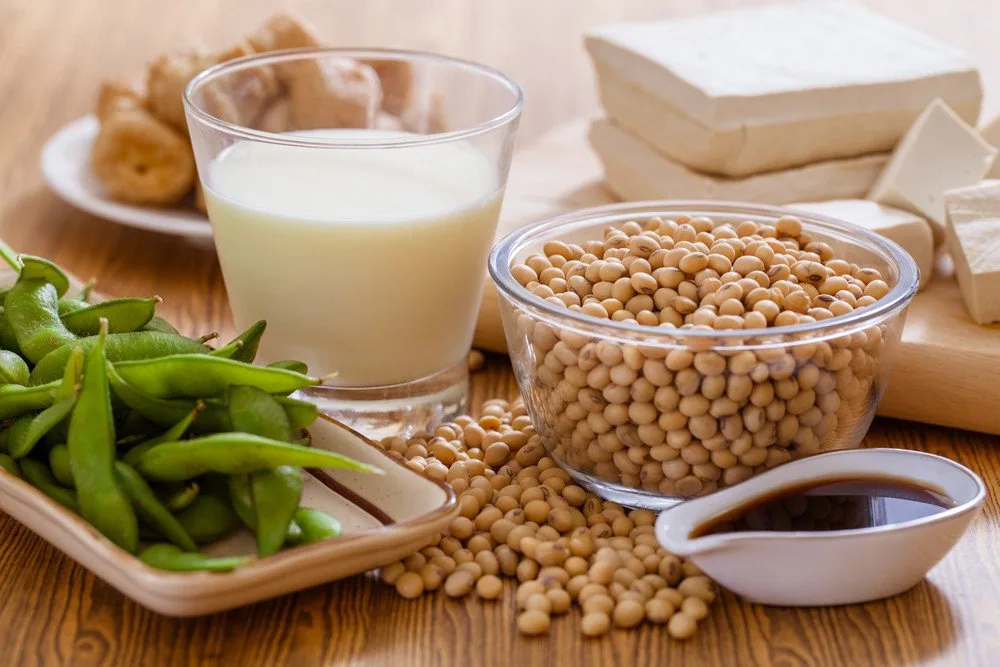Soy has been part of traditional Asian diets for the past millennium, and in recent years, it’s slowly become a staple in many vegans, vegetarian and plant-based diets. Now while the move away from meat products is welcome, you can’t deny that you’ve heard the rumors. There are rumors about whether soy foods are a welcome alternative to meat or rather a serious health risk that we should be avoiding.
Soy continues to be one of the most controversial foods on the planet with many praising its benefits, whilst others claim that it’s actually bad for you – especially because it contains plant estrogens.
So, which is it? Is soy the answer to all things plant-based, or should we avoid it just as much as we avoid red meat? Read on to find out.
But first, what is soy?
Soy products are made from soybeans, which are plant food that belongs to the pea family. They come in many colors, most notably green, yellow and black. Whilst the majority of soybeans are processed into soy foods, soybeans also help to produce soy oil as well as protein powder and soy isoflavone supplements. What’s more, some people even use the remnants of soy oil processing as food for farm animals and pets.
What are the benefits of soy?
Soy has been the subject of many studies, and before we delve into the benefits of soy, it should be noted that many soy-based studies have been financed by the soy industry. It is something worth keeping in mind.

Photo by The Creative Exchange on Unsplash
1. Help reduce breast cancer risk
Lignans and isoflavones are phytoestrogens found in the body that mimic the sex hormone estrogen. Research suggests that in mimicking estrogen, these two compounds can offer cancer-protective benefits.
For instance, a 2014 study found a strong correlation between soy-food and a 26% reduced risk of developing breast cancer. A more recent study echoed these findings by suggesting that suggested isoflavones in soy can help reduce the risk of hormone associated cancers, such as breast cancer.
2. Obesity management
If you’re battling with lockdown weight, then you may need to look to soy-based products. That’s at least according to one animal study.
The study, published last year in the journal Molecules, found that certain compounds in soy isoflavones helped to prevent the buildup of fat around the organs of rats. That said, the researchers believe that the findings prove soy isoflavone’s potential for managing obesity.
3. May improve fertility journey
Studies suggest that soy may help you on your journey in starting a family.
One study found an association between soy consumption and better outcomes for women undergoing fertility treatments. A separate study also found that women who ate soy before in vitro fertilization (IVF) faced a higher chance of a successful pregnancy than those who did not.
Funnily enough, a study published in the journal Andrology found that male soy food intake did not affect or influence IVF outcomes.
4. Relieves menopausal symptoms
If you’re battling with uncomfortable menopausal symptoms like hot flashes, soy foods may help.
Compounds found in soy can mimic estrogen, and this may then help alleviate menopausal symptoms.
A review of 17 studies published in the journal Menopause found that women who had taken a daily dose of soy isoflavones for 12 weeks experienced 20.6% fewer hot flashes and a 26.2% reduction in symptom severity over the course of the study.
5. Reduces type 2 diabetes risk
The isoflavones found in soy may help to improve insulin sensitivity. In fact, a previously mentioned study suggested that soy isoflavones may help to reduce the risk of diabetes. Exactly how it does this is still unknown.
6. Reduces prostate cancer risk
Prostate cancer is currently the second most common cancer found in men worldwide, so it’s important to take the right precautions in reducing one’s risk and it appears that consuming more soy products may help.
A 2018 review of 30 studies (a total of 266,000 men across North America, Europe, and Asia) found a strong correlation between high soy consumption and a lower risk of developing prostate cancer. The study found a 29% reduced risk in regards to all soy foods and a 35% lower risk when it came to non-fermented soy foods.
7. May help prevent heart disease
In 2000, the FDA supported claims that soy protein can support heart health, and the American Heart Association supported these claims (1). That said, in 2008, the AHA sent a letter to the FDA requesting that it reconsider its authorized health claim. This then begs the question of what does current research says about soy products and heart disease?
Well, a 2015 review that looked at 35 studies found that soy products helped to reduce levels of LDL (bad) cholesterol and total cholesterol while raising HDL (good) cholesterol. The researchers also noted that soy supplements did not have the same cholesterol-lowering effect as soy foods.
Another review study published in 2017 looked at 17 observational studies, and that found a strong link between eating more soy foods and a 17% lowered risk of cardiovascular disease and coronary heart disease as well as an 18% lowered risk of stroke.
What are the dangers of soy?
Soy Danger #1: Phytoestrogens
As mentioned, soy contains phytoestrogens which are plant compounds that can mimic the human hormone estrogen. The most popular of these plant compounds are isoflavones, and it is often linked to a number of soy’s health benefits. Unfortunately, it’s also responsible for a few of its health concerns.
This is because disrupting your hormones can affect the way your body functions. In men, hormonal imbalances can affect their libido, energy and it may even increase the risk of ‘man boobs’. With women, hormonal imbalances won’t only disrupt your menstrual cycle, but it can also affect fertility and even increase the risk for some cancers. A review published in the Journal of Nutrition found that high consumption of soy can affect ovarian functioning.

Photo by Kelly Sikkema on Unsplash
What about newborns?
Some formula preparations contain soy and a baby consuming hormones in large quantities is sure to affect their health. Research suggests that exposure to soy phytoestrogens early in life can alter the timing and character of breast development (2). Another study linked soy formula consumption to a greater risk of developing uterine fibroids.
Soy Danger #2: Goitrogenic
Goitrogens are compounds found in soy that may affect thyroid function. According to research, goitrogens affect how much iodine your thyroid gets and this can lead to hypothyroid problems (3).
In fact, a study examining women and men on a vegetarian diet found that women with higher soy intake faced an increased risk of having higher levels of thyroid-stimulating hormone (TSH), which may signify an underactive thyroid.
Soy Danger #3: Phytates
Phytates are anti-nutrients naturally found in a number of foods, including soy.
Being anti-nutrients, phytates affects the body’s absorption of minerals. These include zinc, calcium, iron, and magnesium, which can increase the risk of deficiencies.
While you can neutralize phytates in other foods through soaking and slow cooking, the phytates found in soy can only be neutralized through long fermentation.
Soy Danger #4: Trypsin inhibitors
Trypsin is a digestive enzyme that helps the body break down and digest protein.
Lack of trypsin can cause digestive problems. With soy being high in trypsin inhibitors, eating soy may increase the risk of stomach cramps and diarrhea.
Soy Danger #5: Most soy is GMO
A large majority of soybeans grown in the United States are genetically modified. While more studies are still needed, there has been some research highlighting the negative health effects of GMO foods (4).
What’s more, a lot of soybean crops are sprayed with the chemical herbicides glyphosate, which is rich in controversy.
Soy Danger #6: Fertility

Photo by Dragos Gontariu on Unsplash
While some studies suggest that soy can help with fertility, other studies have found that soy intake may negatively affect fertility.
A study done on 11688 women found an association between high soy isoflavone intake and a lower likelihood of having been pregnant or giving birth to a live child.
It’s clear that more research is needed to properly examine the relationship between soy intake and fertility.
What about Asians and their soy consumption?
Now you may be reading this and wondering if soy is so bad, which is it so prominent in Asian diets and why is the Asian population so healthy?
Well, the fact is, Asians do not eat a lot of soy. Rather, they consume small amounts of soy (around 10 grams a day – 2 teaspoons!) and most of it is fermented, such as nato, miso, or tempeh.
Should I eat soy?
It’s clear that more research is needed to determine all the positive and negative effects of eating soy. If you are looking to eat soy, the best thing to do would be to pick minimally processed forms of soy.
Whole soy products
Whole soy products are the least processed, and they include soybeans and edamame. Soy milk and tofu are also included in this list as they are made from whole soybeans.
- Edamame
– high in plant protein, fiber, vitamins, and minerals.
-Can be enjoyed as a snack or added to soups and salads. - Soy milk
-A common milk alternative
-Is made by soaking and grinding whole soybeans, boiling them in water, and then filtering out the solids. - Tofu – is made from soy milk
Fermented soy
Fermented soy foods are processed by boiling, fermenting, and refining soybeans. They’re also safer to consume as they are free of antinutrients. The most common fermented soy products include soy sauce, tempeh, and miso.

Photo by Luigi Pozzoli on Unsplash
- Tempeh
– Made from soybeans and formed into a firm patty
– A great meat substitute
-Rich in protein - Miso
– Great for your gut
– Can be used in salad dressings and dips.
Who should avoid soy?
If you have a high risk for hormonal cancers and thyroid disorders, it would be advisable to stay clear of soy and soy-based foods.
The bottom line
It’s clear that more high-quality research is needed to fully determine the effect soy consumption can have on our overall health. So, if you really want to be careful, you can opt to skip the soy all together and focus on other plant-based meat substitutes that boost your health, rather than jeopardize it.






![women [longevity live]](https://longevitylive.com/wp-content/uploads/2020/01/photo-of-women-walking-down-the-street-1116984-100x100.jpg)









